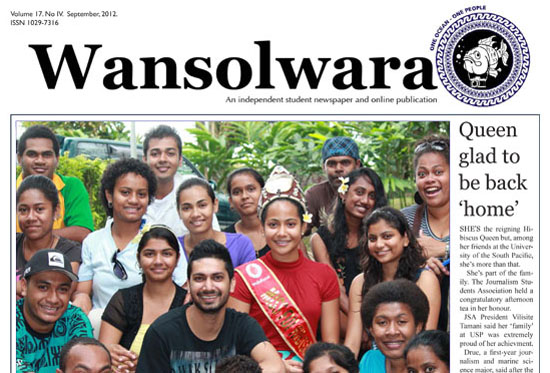
Koila Valemei of Wansolwara
SUVA (Wansolwara / Pacific Media Watch): Fiji journalism needs a lot of improvement, says the University of the South Pacific’s Deputy Vice-Chancellor Dr Esther Williams.
In her opening address at the 2012 Media and Democracy in the South Pacific Symposium at USP, she said: “Reports in the print media are riddled with editorial mistakes, they grow shorter and shorter, while those in our news broad-casts are even shorter and the quality of English is pretty poor.
“Our papers in Fiji, for instance, have sizeable coverage on entertainment and consumerism adverts,” she said.
She said that on the morning radio programmes “editors become obsessed with stories that will report on conflicts more than anything else”.
The state of affairs, she said, pointed to the urgent need for professional capacity building in this sector.
Journalism educator and former head of USP Journalism Shailendra Singh said training alone was not the solution to lifting quality because significant improvement in journalists’ salaries and conditions were needed.
“Many journalism students move in and then move right out of mainstream media into public relations because of poor working conditions but developing that experience is key to writing analytically and providing more in-depth quality stories,” he said.
“In Australia, there are so many older pot-bellied, balding journalists who churn out analytical pieces but in Fiji, there is a dearth of such experienced, older journalists.
“A journalism education will have a bearing on earning capacity so there’s less chances of leaving; more experience will be gained…along with a more analytical, interpretative approach and this will also mean, being less likely to be manipulated by government,” Singh said.
Permanent Secretary for Information, Sharon Smith-Johns said the government wanted a “vigorous media but with certain conditions that are prerequisite in most countries: not fuel racial division, not threaten peace and order, not damage economy and people’s jobs”.
She urged Fiji’s journalists to take advantage of the lifting of censorship to begin fully informing media consumers.
“You will hear a lot about self- censorship, the notion that journalists in Fiji are too afraid to report fully and without fear or favour,” she said.
“Such fears are understandable in the transition from censorship to freedom. But I urge journalists not to use this as an excuse not to do their jobs.”
More stories on the media symposium in the latest edition on Wansolwara, published as a liftout in the Fiji Sun on September 6.
Full pdf download here.
This work is licensed under a Creative Commons Attribution-NonCommercial 3.0 New Zealand Licence.




